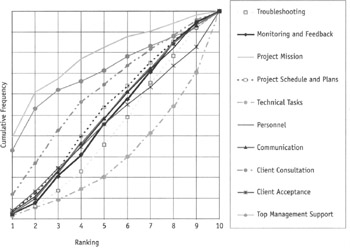What About the Key Success Factors?
|
We used the general frame of the famous "Ten-Factors Model" (Slevin and Pinto 1988) but in a simple way, asking for the ordering of the ten factors from one to ten. An explanation of the meaning of every factor was provided in the questionnaire in order to avoid misunderstandings. The general results (Figure 4) indicate very clearly that the project mission is considered the most important success factor, followed by top management support and by client consultation. Then with the same score come the next four factors: project schedule and plans, personnel, communication, and monitoring and feedback. Client acceptance and troubleshooting are considered relatively less—and the very backbench is for technical tasks.

Figure 4: Ordinal Ranking of Key Success Factors (659 Answers)
Calculations were also realized in introducing filters such as job function of the respondent, size of his company, nature of the status of the company, project orientation of the company, degree of experience cumulated in internal or external project, degree of experience according to specific role played in projects, and so on.
According to the status of the company, there are few differences between the respective ranking for private or public sector except for the personnel factor classified in fourth position in public sector and in sixth position for private one. Also the communication factor placed respectively in fifth versus seventh position.
A significant variance has been found between project-oriented companies or those not project oriented.
On the contrary, the size of the company variable is significant for three factors essentially. Client consultation is set in first place by people working in very little companies (< 10 employees) but always put in third place for any other company of the sample. The communication factor is better appreciated by little companies: third for companies with less of fifty persons, fifth for companies with a manpower comprised between fifty and 500, and seventh for companies over 500 employees.
It is very interesting to compare the ranking of success factors taking into consideration the job function of each respondent. In every situation, the top management support and project mission factors are fighting for the first place. Client consultation is quite always situated at the third place except for people taking care of human resources or production (5th). Project schedule and plans is a very unstable factor: second position for R&D people, seventh position for logistics and computer facility people, even eighth for human relations staff. The monitoring and feedback factor is also relatively unsteady but it is privileged by people working as financial or human resources staff (4th) and by project management specialists, R&D, and commercial employees (5th). The personnel factor fluctuates from the fifth to the seventh place except for project management consultants (9th) and computerists (8th), but got a brilliant third place for people from the production department. The communication factor is very unstable, varying generally from fourth to sixth place, but it obtained a third place by manpower staff people against a eighth place by the top management. The troubleshooting factor varies between the seventh and the ninth places except for logisticians (5th), top management, and human relations staff (6th), and the last position for manufacturing people. Client acceptance has the same range of variation as the troubleshooting factor but it is placed in fourth position by computerists, in fifth by top management, in sixth by project management consultants, and a not so surprisingly in tenth by R&D employees. Finally, the technical tasks factor is always at the last rank except for production people who give it the seventh score.
Nonetheless, these preliminary results deserve further investigation in order to determine precisely which kind of variables are the most influential in determining the ranking of success factors by the respondents.
|
EAN: 2147483647
Pages: 207